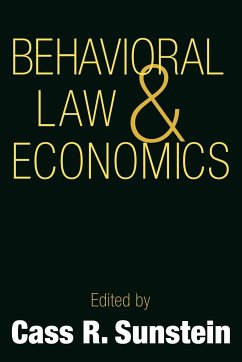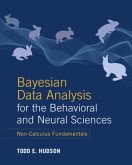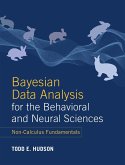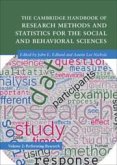- Broschiertes Buch
- Merkliste
- Auf die Merkliste
- Bewerten Bewerten
- Teilen
- Produkt teilen
- Produkterinnerung
- Produkterinnerung
Analyzes law with reference to new findings in cognitive psychology and behavioral economics.
This is the first book that tries to analyze law by showing how people actually behave. It emphasizes that people are frequently unselfish, have limited willpower and self-control, and often rely on mental short-cuts and rules of thumb. It offers important new insights and suggestions for legal reform.
Andere Kunden interessierten sich auch für
![Inside the Juror Inside the Juror]() Reid Hastie (ed.)Inside the Juror61,99 €
Reid Hastie (ed.)Inside the Juror61,99 €![Bayesian Data Analysis for the Behavioral and Neural Sciences Bayesian Data Analysis for the Behavioral and Neural Sciences]() Todd E. Hudson (New York University)Bayesian Data Analysis for the Behavioral and Neural Sciences78,99 €
Todd E. Hudson (New York University)Bayesian Data Analysis for the Behavioral and Neural Sciences78,99 €![Cognitive-Behavioral Therapy for Avoidant/Restrictive Food Intake Disorder Cognitive-Behavioral Therapy for Avoidant/Restrictive Food Intake Disorder]() Jennifer J. ThomasCognitive-Behavioral Therapy for Avoidant/Restrictive Food Intake Disorder46,99 €
Jennifer J. ThomasCognitive-Behavioral Therapy for Avoidant/Restrictive Food Intake Disorder46,99 €![The Human Rights to Water and Sanitation The Human Rights to Water and Sanitation]() Leo HellerThe Human Rights to Water and Sanitation43,99 €
Leo HellerThe Human Rights to Water and Sanitation43,99 €![Bayesian Data Analysis for the Behavioral and Neural Sciences Bayesian Data Analysis for the Behavioral and Neural Sciences]() Todd E. Hudson (New York University)Bayesian Data Analysis for the Behavioral and Neural Sciences120,99 €
Todd E. Hudson (New York University)Bayesian Data Analysis for the Behavioral and Neural Sciences120,99 €![The Cambridge Handbook of Research Methods and Statistics for the Social and Behavioral Sciences The Cambridge Handbook of Research Methods and Statistics for the Social and Behavioral Sciences]() The Cambridge Handbook of Research Methods and Statistics for the Social and Behavioral Sciences70,99 €
The Cambridge Handbook of Research Methods and Statistics for the Social and Behavioral Sciences70,99 €![The Behavioral Economics and Politics of Global Warming The Behavioral Economics and Politics of Global Warming]() Hersh Shefrin (California Santa Clara University)The Behavioral Economics and Politics of Global Warming22,99 €
Hersh Shefrin (California Santa Clara University)The Behavioral Economics and Politics of Global Warming22,99 €-
-
-
Analyzes law with reference to new findings in cognitive psychology and behavioral economics.
This is the first book that tries to analyze law by showing how people actually behave. It emphasizes that people are frequently unselfish, have limited willpower and self-control, and often rely on mental short-cuts and rules of thumb. It offers important new insights and suggestions for legal reform.
This is the first book that tries to analyze law by showing how people actually behave. It emphasizes that people are frequently unselfish, have limited willpower and self-control, and often rely on mental short-cuts and rules of thumb. It offers important new insights and suggestions for legal reform.
Produktdetails
- Produktdetails
- Cambridge Series on Judgment and Decision Making
- Verlag: Cambridge University Press
- Seitenzahl: 448
- Erscheinungstermin: 11. April 2008
- Englisch
- Abmessung: 229mm x 152mm x 27mm
- Gewicht: 670g
- ISBN-13: 9780521667432
- ISBN-10: 0521667437
- Artikelnr.: 21165138
- Herstellerkennzeichnung
- Libri GmbH
- Europaallee 1
- 36244 Bad Hersfeld
- gpsr@libri.de
- Cambridge Series on Judgment and Decision Making
- Verlag: Cambridge University Press
- Seitenzahl: 448
- Erscheinungstermin: 11. April 2008
- Englisch
- Abmessung: 229mm x 152mm x 27mm
- Gewicht: 670g
- ISBN-13: 9780521667432
- ISBN-10: 0521667437
- Artikelnr.: 21165138
- Herstellerkennzeichnung
- Libri GmbH
- Europaallee 1
- 36244 Bad Hersfeld
- gpsr@libri.de
Introduction Cass R. Sunstein; Part I. Overviews and Prospects: 1. A
behavioral approach to law and economics Christine Jolls, Cass R. Sunstein
and Richard Thaler; Part II. Heuristics and Biases: Shortcuts, Errors and
Legal Decisions: 2. Context-dependence in legal decision making Mark
Kelman, Yuval Rottenstreich and Amos Tversky; 3. A positive psychological
theory of judging in hindsight Jeffrey J. Rachlinski; 4. Behavioral
economics, contract formation, and contract law Russell Korobkin; 5.
Organized illusions: a behavioral theory of why corporations mislead stock
market investors (and cause other social harms) Donald C. Langevoort; 6.
Reluctance to vaccinate: omission bias and ambiguity Ilana Ritov and
Jonathan Baron; 7. Second-order decisions Cass R. Sunstein and Edna
Ullmann-Margalit; Part III. Valuation: Values and Dollars in the Legal
System: 8. Experimental tests of the endowment effect and the cause theorem
Daniel J. Kahneman, Jack L. Knetsch and Richard H. Thaler; 9. Assessing
punitive damages (with notes on cognition and valuation in law) Cass R.
Sunstein, Daniel J. Kahneman and David Schkade; 10. Framing the jury:
cognitive perspective on pain and suffering award Edward J. McCaffery,
Daniel J. Kahneman and Matthew L. Spitzer; 11. Behavioral economic analysis
of redistributive legal rules Christine Jolls; 12. Do parties to nuisance
cases bargain after judgment? A glimpse inside the cathedral Ward
Fransworth; Part IV. The Demand for Law: Why Law Is As It Is: 13. Some
implications of cognitive psychology for risk regulation Roger G. Noll and
James E. Krier; 14. Explaining bargaining impasse: the role of self-serving
biases Linda Babcock and George Loewenstein; 15. Controlling availability
cascades Timur Kuran and Cass R. Sunstein; 16. Cognitive theory and tax
Edward J. McCaffery.
behavioral approach to law and economics Christine Jolls, Cass R. Sunstein
and Richard Thaler; Part II. Heuristics and Biases: Shortcuts, Errors and
Legal Decisions: 2. Context-dependence in legal decision making Mark
Kelman, Yuval Rottenstreich and Amos Tversky; 3. A positive psychological
theory of judging in hindsight Jeffrey J. Rachlinski; 4. Behavioral
economics, contract formation, and contract law Russell Korobkin; 5.
Organized illusions: a behavioral theory of why corporations mislead stock
market investors (and cause other social harms) Donald C. Langevoort; 6.
Reluctance to vaccinate: omission bias and ambiguity Ilana Ritov and
Jonathan Baron; 7. Second-order decisions Cass R. Sunstein and Edna
Ullmann-Margalit; Part III. Valuation: Values and Dollars in the Legal
System: 8. Experimental tests of the endowment effect and the cause theorem
Daniel J. Kahneman, Jack L. Knetsch and Richard H. Thaler; 9. Assessing
punitive damages (with notes on cognition and valuation in law) Cass R.
Sunstein, Daniel J. Kahneman and David Schkade; 10. Framing the jury:
cognitive perspective on pain and suffering award Edward J. McCaffery,
Daniel J. Kahneman and Matthew L. Spitzer; 11. Behavioral economic analysis
of redistributive legal rules Christine Jolls; 12. Do parties to nuisance
cases bargain after judgment? A glimpse inside the cathedral Ward
Fransworth; Part IV. The Demand for Law: Why Law Is As It Is: 13. Some
implications of cognitive psychology for risk regulation Roger G. Noll and
James E. Krier; 14. Explaining bargaining impasse: the role of self-serving
biases Linda Babcock and George Loewenstein; 15. Controlling availability
cascades Timur Kuran and Cass R. Sunstein; 16. Cognitive theory and tax
Edward J. McCaffery.
Introduction Cass R. Sunstein; Part I. Overviews and Prospects: 1. A
behavioral approach to law and economics Christine Jolls, Cass R. Sunstein
and Richard Thaler; Part II. Heuristics and Biases: Shortcuts, Errors and
Legal Decisions: 2. Context-dependence in legal decision making Mark
Kelman, Yuval Rottenstreich and Amos Tversky; 3. A positive psychological
theory of judging in hindsight Jeffrey J. Rachlinski; 4. Behavioral
economics, contract formation, and contract law Russell Korobkin; 5.
Organized illusions: a behavioral theory of why corporations mislead stock
market investors (and cause other social harms) Donald C. Langevoort; 6.
Reluctance to vaccinate: omission bias and ambiguity Ilana Ritov and
Jonathan Baron; 7. Second-order decisions Cass R. Sunstein and Edna
Ullmann-Margalit; Part III. Valuation: Values and Dollars in the Legal
System: 8. Experimental tests of the endowment effect and the cause theorem
Daniel J. Kahneman, Jack L. Knetsch and Richard H. Thaler; 9. Assessing
punitive damages (with notes on cognition and valuation in law) Cass R.
Sunstein, Daniel J. Kahneman and David Schkade; 10. Framing the jury:
cognitive perspective on pain and suffering award Edward J. McCaffery,
Daniel J. Kahneman and Matthew L. Spitzer; 11. Behavioral economic analysis
of redistributive legal rules Christine Jolls; 12. Do parties to nuisance
cases bargain after judgment? A glimpse inside the cathedral Ward
Fransworth; Part IV. The Demand for Law: Why Law Is As It Is: 13. Some
implications of cognitive psychology for risk regulation Roger G. Noll and
James E. Krier; 14. Explaining bargaining impasse: the role of self-serving
biases Linda Babcock and George Loewenstein; 15. Controlling availability
cascades Timur Kuran and Cass R. Sunstein; 16. Cognitive theory and tax
Edward J. McCaffery.
behavioral approach to law and economics Christine Jolls, Cass R. Sunstein
and Richard Thaler; Part II. Heuristics and Biases: Shortcuts, Errors and
Legal Decisions: 2. Context-dependence in legal decision making Mark
Kelman, Yuval Rottenstreich and Amos Tversky; 3. A positive psychological
theory of judging in hindsight Jeffrey J. Rachlinski; 4. Behavioral
economics, contract formation, and contract law Russell Korobkin; 5.
Organized illusions: a behavioral theory of why corporations mislead stock
market investors (and cause other social harms) Donald C. Langevoort; 6.
Reluctance to vaccinate: omission bias and ambiguity Ilana Ritov and
Jonathan Baron; 7. Second-order decisions Cass R. Sunstein and Edna
Ullmann-Margalit; Part III. Valuation: Values and Dollars in the Legal
System: 8. Experimental tests of the endowment effect and the cause theorem
Daniel J. Kahneman, Jack L. Knetsch and Richard H. Thaler; 9. Assessing
punitive damages (with notes on cognition and valuation in law) Cass R.
Sunstein, Daniel J. Kahneman and David Schkade; 10. Framing the jury:
cognitive perspective on pain and suffering award Edward J. McCaffery,
Daniel J. Kahneman and Matthew L. Spitzer; 11. Behavioral economic analysis
of redistributive legal rules Christine Jolls; 12. Do parties to nuisance
cases bargain after judgment? A glimpse inside the cathedral Ward
Fransworth; Part IV. The Demand for Law: Why Law Is As It Is: 13. Some
implications of cognitive psychology for risk regulation Roger G. Noll and
James E. Krier; 14. Explaining bargaining impasse: the role of self-serving
biases Linda Babcock and George Loewenstein; 15. Controlling availability
cascades Timur Kuran and Cass R. Sunstein; 16. Cognitive theory and tax
Edward J. McCaffery.









